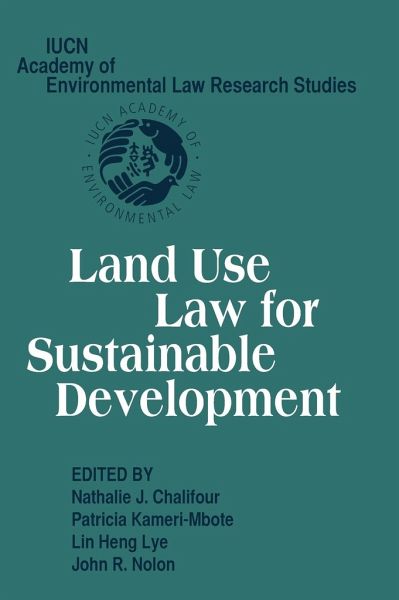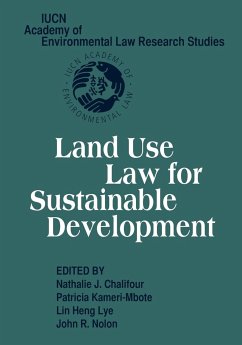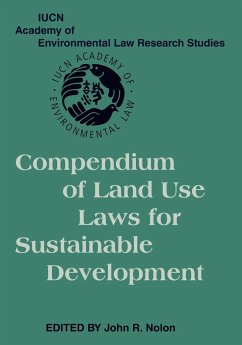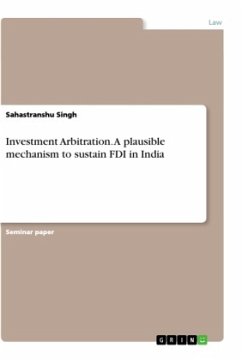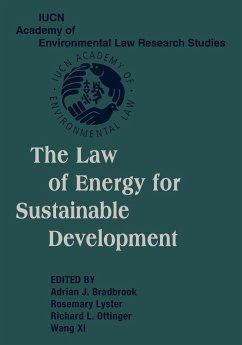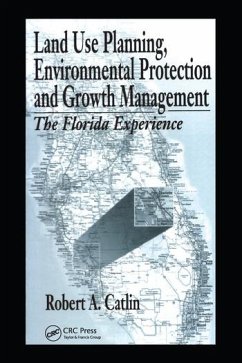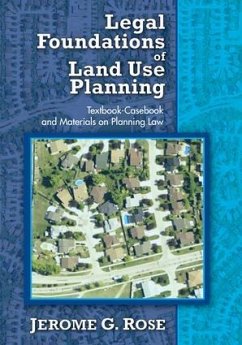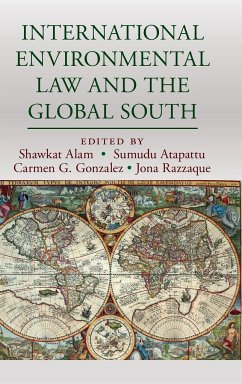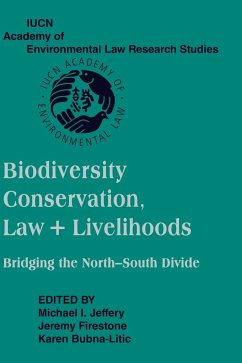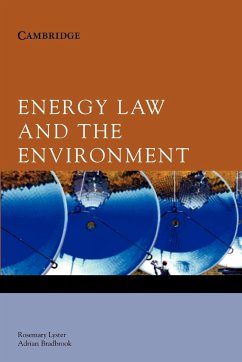Land Use Law Sustain Development
Versandkostenfrei!
Versandfertig in 1-2 Wochen
Weitere Ausgaben:

PAYBACK Punkte
85 °P sammeln!




This book surveys the global experience in implementing land-use policies to move towards sustainable development.
Nathalie J. Chalifour is an Assistant Professor in the Faculty of Law at the University of Ottawa in Ontario, where her teaching and research interests fall in the areas of environmental law, property law and international environmental law and policy. She holds a Doctorate in Law and a Masters of Law from Stanford University, where she completed a research fellowship as a Fulbright Scholar. Nathalie has served as Senior Advisor to the President CEO of the National Round Table on the Environment and the Economy (NRTEE), a government agency that advises the Prime Minister of Canada on how best to achieve sustainable development. She has also been a Senior Policy Advisor to the World Wildlife Fund, and has taught in, and directed, the Nairobi International Law Institute. She also has written numerous works in the field of environmental law and policy, such as book chapters on environmental taxation and articles on the nexus between international trade rules and forest conservation. She is contributing editor of the looseleaf service, The Canadian Brownfields Manual (2005).
Patricia Kameri-Mbote is an Associate Professor of Law and Chair of Department, Department of Private Law, Faculty of Law, University of Nairobi. She holds a Doctorate in Law and a Master of Laws Degree from Stanford University; a Master of Laws in Law and Development from Warwick University and a Postgraduate Diploma in Women's Law from the University of Zimbabwe. Her teaching and research interests fall in the areas of environmental law, law, science and technology, intellectual property rights, land law and feminist jurisprudence. She has served as Acting Dean of the Faculty of Law and research director at the African Centre for Technology Studies in Nairobi. She has also taught international environmental law at the University of Kansas. She is a member of the IUCN Commission on Environmental Law. She has published widely in the areas of international environmental law, biotechnology, women's rights and property rights.
Lin Heng Lye is an Associate Professor in the Faculty of Law at the National University of Singapore, and Deputy Director of the Faculty's Asia-Pacific Centre for Environmental Law. She chairs the University's inter-disciplinary Executive Committee for the Masters in Environmental Management programme and is Visiting Associate Professor at the Yale School of Forestry Environmental Studies. She holds masters' degrees in law from Harvard University and the University of London, and an LLB from the University of Singapore. She is an Advocate Solicitor of the Supreme Court of Singapore, and was Vice-Dean and Director of the Law Faculty's Graduate programmes. She is a member of the Land Titles (Strata) Board, and a former member of Singapore's public housing authority, the Housing Development Board (HDB) and the Tenants' Compensation Board. She has written and presented papers on environmental law in Singapore and Southeast Asia at conferences worldwide, She also teaches at the University of Sydney Law School. She is a consultant-trainer to the Regional Institute of Environmental Technology, was consultant to TRAFFIC Indochina, and has conducted capacity-building programmes for the World Bank, Asian Development Bank and the Ministry of Environment and Water Resources, Singapore.
John Nolon received his JD degree from the University of Michigan Law School, where he was a member of the Barrister's Academic Honor Society. His undergraduate degree is from the University of Nebraska, where he was President of the Senior Honor Society. He has served as a consultant to President Carter's Council on Development Choices for the 1980's, President Clinton's Council on Sustainable Development, New York Governor George Pataki's Transition Team, and the statewide Quality Communities Advisory Board directed by Lieutenant Governor Mary Donohue. Professor Nolon has been appointed Visiting Professor of Environmental Law at the Yale School of Forestry and Environmental Studies and named the Director of the Joint Center of Land Use Studies formed by Yale and Pace Law School. He served on the Editorial Advisory Board of the National Housing and Development Reporter and is a member of the Editorial Board of The Land Use and Environmental Law Review, published by Thompson-West. He has worked extensively on sustainable development in South America as a Fulbright scholar.
Patricia Kameri-Mbote is an Associate Professor of Law and Chair of Department, Department of Private Law, Faculty of Law, University of Nairobi. She holds a Doctorate in Law and a Master of Laws Degree from Stanford University; a Master of Laws in Law and Development from Warwick University and a Postgraduate Diploma in Women's Law from the University of Zimbabwe. Her teaching and research interests fall in the areas of environmental law, law, science and technology, intellectual property rights, land law and feminist jurisprudence. She has served as Acting Dean of the Faculty of Law and research director at the African Centre for Technology Studies in Nairobi. She has also taught international environmental law at the University of Kansas. She is a member of the IUCN Commission on Environmental Law. She has published widely in the areas of international environmental law, biotechnology, women's rights and property rights.
Lin Heng Lye is an Associate Professor in the Faculty of Law at the National University of Singapore, and Deputy Director of the Faculty's Asia-Pacific Centre for Environmental Law. She chairs the University's inter-disciplinary Executive Committee for the Masters in Environmental Management programme and is Visiting Associate Professor at the Yale School of Forestry Environmental Studies. She holds masters' degrees in law from Harvard University and the University of London, and an LLB from the University of Singapore. She is an Advocate Solicitor of the Supreme Court of Singapore, and was Vice-Dean and Director of the Law Faculty's Graduate programmes. She is a member of the Land Titles (Strata) Board, and a former member of Singapore's public housing authority, the Housing Development Board (HDB) and the Tenants' Compensation Board. She has written and presented papers on environmental law in Singapore and Southeast Asia at conferences worldwide, She also teaches at the University of Sydney Law School. She is a consultant-trainer to the Regional Institute of Environmental Technology, was consultant to TRAFFIC Indochina, and has conducted capacity-building programmes for the World Bank, Asian Development Bank and the Ministry of Environment and Water Resources, Singapore.
John Nolon received his JD degree from the University of Michigan Law School, where he was a member of the Barrister's Academic Honor Society. His undergraduate degree is from the University of Nebraska, where he was President of the Senior Honor Society. He has served as a consultant to President Carter's Council on Development Choices for the 1980's, President Clinton's Council on Sustainable Development, New York Governor George Pataki's Transition Team, and the statewide Quality Communities Advisory Board directed by Lieutenant Governor Mary Donohue. Professor Nolon has been appointed Visiting Professor of Environmental Law at the Yale School of Forestry and Environmental Studies and named the Director of the Joint Center of Land Use Studies formed by Yale and Pace Law School. He served on the Editorial Advisory Board of the National Housing and Development Reporter and is a member of the Editorial Board of The Land Use and Environmental Law Review, published by Thompson-West. He has worked extensively on sustainable development in South America as a Fulbright scholar.
Produktdetails
- Verlag: Cambridge University Press
- Seitenzahl: 654
- Erscheinungstermin: 8. Februar 2007
- Englisch
- Abmessung: 260mm x 183mm x 39mm
- Gewicht: 1406g
- ISBN-13: 9780521862165
- ISBN-10: 0521862167
- Artikelnr.: 21984245
Herstellerkennzeichnung
Libri GmbH
Europaallee 1
36244 Bad Hersfeld
gpsr@libri.de
Für dieses Produkt wurde noch keine Bewertung abgegeben. Wir würden uns sehr freuen, wenn du die erste Bewertung schreibst!
Eine Bewertung schreiben
Eine Bewertung schreiben
Andere Kunden interessierten sich für




